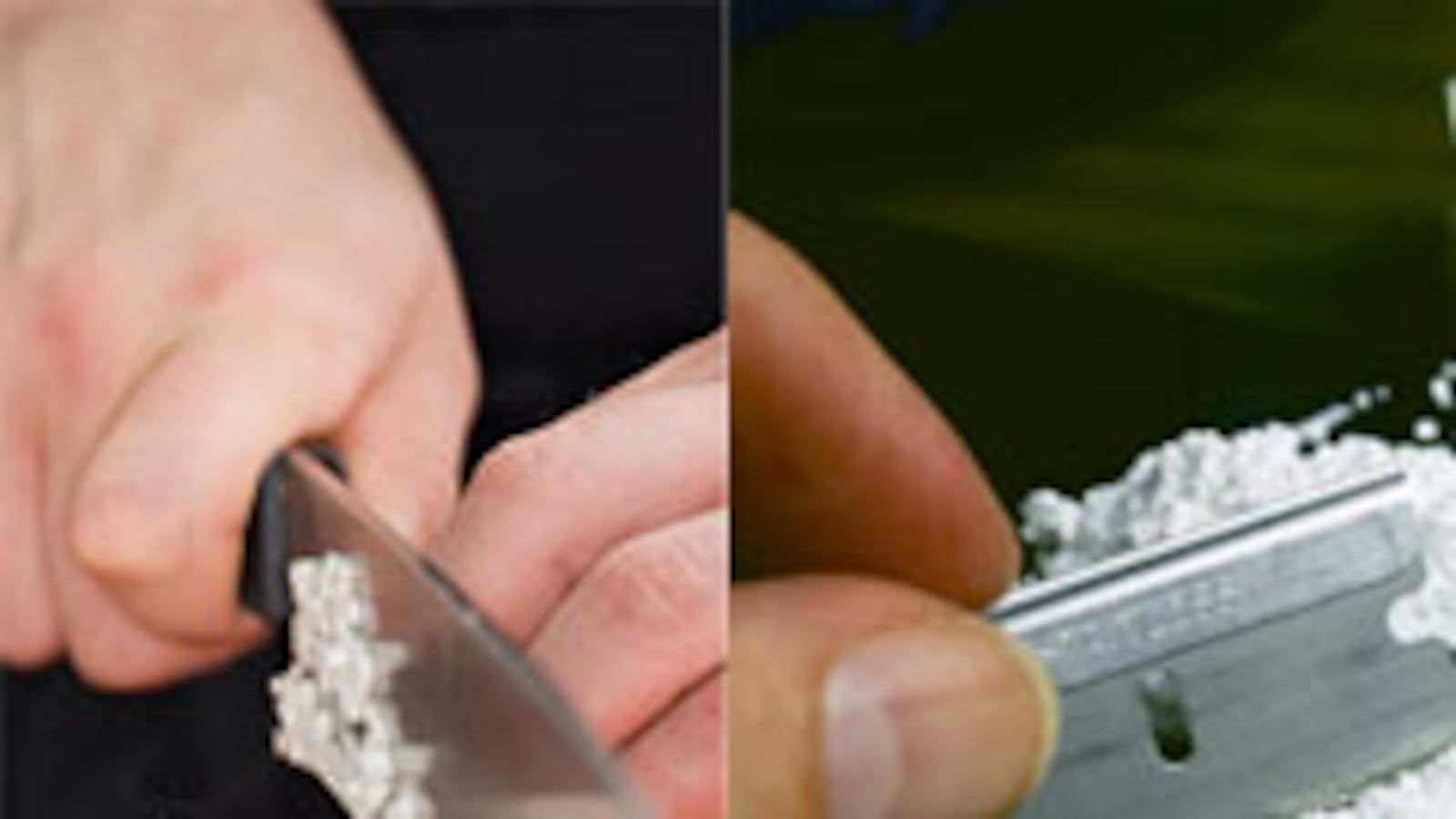
Stepping in out of the sun, through the back door that let out into the grimy alley behind the kitchen, Andy snuck in, late, but with an alien grace. Work in the kitchen lost a pace: The tocktocktock of knives on cutting boards, the clatter from the dish machine and rhythmic rasp of the diamond steel as I cleaned up my edge for the night—all of it eased, because Andy was here now and he was fuuucked up, bent out of his head on opium, claiming that he’d eaten it (accidentally) on a salad in the park.
“Who eats salad from a stranger in the park?” we asked.
The answer: Andy did. We tried to send him home. He wouldn’t go, insisting that he was fine to stand his station. For the rest of the night, we’d call an order for a simple salad and would be handed a pepper mill. We’d ask for pâté, for rillettes, for a double-garden-on-the-side. We’d get half heads of lettuce dressed in skordalia, white plates doodled with sauce, completely imaginary salads: One plate set with a fork and a squeeze bottle. Andy was inventing Dadaist cuisine on the spot, and for a while we were having so much fun waiting to see what he’d come up with next that we forgot someone needed to back him up and actually do the job.
In the psychoactive hierarchy of kitchen work, a high-functioning junkie beats a one-time opium eater.
That task fell to Al, our emergency backup, all-hope-is-lost dishwasher and prep guy. He was a friend, and no matter when we put in the call, Al would show up. He was a regular abuser of strong chemicals—heroin, mostly—but in the psychoactive hierarchy of kitchen work, a high-functioning junkie beats a one-time opium eater.
When Al arrived, Andy was back out in the alley again, having a deep and heated conversation with a chainlink fence.
“What’s up with him?” Al asked.
Al was talking to the dish machine, but at least he was inside.
That was just one night. That was just one story. I was asked once how many kitchens I thought had employees who regularly used drugs. Without even thinking, I blurted out, “Ninety-five percent, easy.” It was like asking me how many kitchens had cooks in them. How many used knives. And while in retrospect (and out of an admission that things might have changed in the restaurant industry since I left the closed society of chefs a few years back, turned traitor, and started writing about kitchens rather than cooking in them), I might’ve tempered my answer somewhat had I taken the time to think before I opened my big, dumb mouth, it is also true that my own personal experience was different, too.
In the kitchens where I worked, that percentage would’ve been closer to 100.
So what is it with cooks and drugs? The common refrain these days—the wisdom—is that chefs are like rock stars and, thus, are both victim to and willing participants in all of the cliché rock-star excesses. Having rocketed so lately up the ladder from simple, rough tradesmen to a hundred strutting Mick Jaggers, it’s like they’ve suddenly been given the keys to some magical hoard of Perrier-Jouët, writhing supermodels, and high-grade blow.
Problem is, the wisdom? It’s a bunch of crap. See, I’ve been led to understand that with celebrity comes money, connections and willing fixers, groupies, dealers, and the kind of dim-witted personal assistants that can be tricked into carrying your loaded crack pipe through Customs. But I have to take this all on faith because I never approached anything even vaguely resembling the rock-star celebrity that some chefs have attained while I was on the line, and yet, that never stopped me from getting high. Nor did similar situations slow in the least the epic consumption and general bad behavior of the cooks, chefs, mercenary prep specialists, mad bakers, brilliant losers, and passionate, damaged freaks with whom I surrounded myself back when I made my living cooking dinner for strangers. The drugs (and the sex and, for that matter, the rock 'n' roll, too) predated the fame, the money, the connections. They predate everything, perhaps, but the food.
So if it isn’t fame, then, that drives this seemingly rampant urge to screw with one’s brain chemistry—if it isn’t celebrity (alone) or money (alone) or pure, unfettered access (alone)—what is it?
It’s Andy. Or rather, guys like Andy. Like me. Like all those guys I came up with who loved the work but loved the lifestyle more—the heat and noise and fury and serious, high-wire strangeness of the professional kitchen. I knew guys who self-medicated fiercely, who held to the notion of the body as a machine that must be kept going no matter what it takes. I knew others who were just in it for the action—the toes-to-top adrenaline-junkie aspect of the job. First hit on a Friday night? To a certain kind of boy (the kind that I most certainly was), that’s the best hit in the world—better than the best drug ever invented, like getting a taste of God’s own stash. But on those nights when it doesn’t come through? Well, hell, kid. That rush can come by the baggie, too, provided you know who to ask…
But I think the kindest explanation, and maybe the truest, is that chefs are just wired for drug use from the start. Being a cook or a chef means being in the pleasure business, after all; means being the sort of person who has a yen for experimentation and excess. You want to serve what’s good, first you must know what’s good. You’ve got to be willing to try anything once—a lesson that has a tendency to travel outside the confines of the kitchen. Even now, many years gone, there are kitchens I can’t evoke without also summoning up the alleys and bars that surrounded them, girls I can’t remember without the memory of the mingled tastes of lukewarm Labatts Blue and dope tar on their lips.
Chefs are curious. They’re adventurous. They’re risk-takers by nature—the kind of people who would, in fact, eat salad from a stranger in the park. I never knew one who didn’t have some serious impulse-control issues—who was able to blithely pass up any new thing that passed under his nose. There’s just something latent in the genes of the great ones that makes them always starving for new experiences, for new kicks, for more fun. There’s that old story about the caveman, first one who ever looked down at an oyster (a rock full of meat) and said to himself, “Hey, I wonder what that tastes like.” Good chefs and dedicated cooks have a little bit of that guy’s blood in them as well. And really? There’s just not a lot of difference between the first time you suck down an oyster, the first taste of uni, first salty shock of caviar, first time the joint comes your way.
I took my first bump of crystal meth crouched down between two cars in a diner parking lot in upstate New York. I did it because it was offered to me. Because I’d never tried it before. It never even occurred to me to say no.
I did my last line of cocaine almost 10 years later, off the rail of a pool table in a shitty attic apartment while Tom Waits played on the radio, surrounded by a dozen-odd chefs and allied tradesmen all either getting up or coming down. It was a couple days before New Year’s Eve. The bakers were all on their way in to work. The cooks were all just trying to forget the galleys they’d just left. And when the sun came up, I walked away more or less clean.
In between those two poles of experience stretched a decade’s worth of on-again/off-again use and abuse—of 18-hour days and 100-hour weeks, of terrible pressure, brilliant joy, small failures and smaller victories. I was stupid, I was childish, and I have a few regrets, but I’d also be lying if I didn’t say that I had a lot of good times along the way. And while I’m not arguing here that all cooks are degenerate libertines or that a taste for strong chemicals and powerful weirdness is necessary for the development of a young man with culinary aspirations, neither do I want to be some proselytizing, hypocritical ex-junkie who betrays his own memory, his own past, and claims that it was all some awful nightmare. I was a cook who ran with cooks in the days before any of us dreamed of celebrity. We worked hard. We behaved badly. We had some fun.
In the end, we were all the guys who would’ve eaten the salad.
Plus: Check out Hungry Beast, for more news on the latest restaurants, hot chefs, and tasty recipes.
Jason Sheehan is a former dishwasher, fry-cook, grillardin and chef, and is currently a James Beard Award-winning food writer and restaurant critic for Westword newspaper in Denver. His work has appeared in Best Food Writing for the past five years. His new book, Cooking Dirty: A Story of Life, Sex, Love and Death in the Kitchen, is on shelves now.





